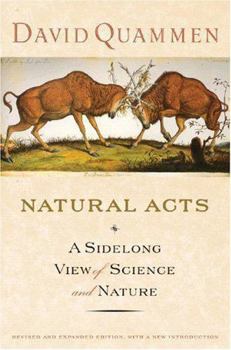Natural Acts: A Sidelong View of Science and Nature
Select Format
Select Condition 
Book Overview
"Lively writing about science and nature depends less on the offering of good answers, I think, than on the offering of good questions," said David Quammen in the original introduction to Natural Acts. For more than two decades, he has stuck to that credo. In this updated version of his first essay collection, Quammen's lively curiosity leads him from New Mexico to Romania, from the Congo to the Amazon, asking questions about mosquitoes (what are their redeeming merits?), dinosaurs (how did they change the life of a dyslexic Vietnam vet?), and cloning (can it save endangered species?). This expanded edition returns to print Quammen's best-loved "Natural Acts" columns, which first appeared in Outside magazine in the early 1980s, and includes recent pieces such as "Planet of Weeds," an influential Harper's cover story. The new Natural Acts is an eye-opening journey that will please both Quammen fans and newcomers to his work.
Format:Hardcover
Language:English
ISBN:0393058050
ISBN13:9780393058055
Release Date:March 2008
Publisher:W. W. Norton & Company
Length:352 Pages
Weight:1.18 lbs.
Dimensions:1.1" x 5.8" x 8.3"
Customer Reviews
5 ratings
New Meets Old
Published by Thriftbooks.com User , 16 years ago
Although I'd read Natural Acts, it was the only collection of David Quammen's essays I didn't own so I was happy to see it republished in this new edition. Half of its length is now made up of 7 newer pieces not in the original, while 11 of the original essays have been eliminated. In the new introduction, Quammen offers three objectives for the book: putting what he considered the best of the original back in print, publishing some of his favorite more recent work in book format, and providing the opportunity to see how a writer has changed during the intervening quarter century. My opinion on that last one--he may well be a better, more knowledgeable writer now, but I do miss the sense of fun and brevity in the earlier shorter magazine columns. Still, I consider the best and most important essay here to be one in the newer section. Planet of Weeds explores the sixth mass extinction now underway, humans rich and poor, invasive and "weed" species, and who is likely to still be around when planetary life hits its next low point--an excellent if depressing essay. Another recent winner concerns the life and death of a dog and a lesson learned about community. I was curious to see what the author decided to eliminate so I checked out a library copy of the old edition. For the most part, I found the cut essays to be dated, either by changed numbers and facts or because they were in response to a then current issue or book. A couple others seemed a bit dull. I would have liked to see 3 of the deleted essays remain--a funny one about sea cucumbers probably cut for personal reasons, one about a wild tiger and the trip to see him, and especially one about bison which seemed completely solid to me. I hope this will help you decide whether to read the new, the old, or both editions.
not painful
Published by Thriftbooks.com User , 24 years ago
Science writing is rarely both illuminating and entertaining, and that is why this book is exceptional.
Should be 6 Stars.......... Simply Great
Published by Thriftbooks.com User , 25 years ago
Having read many science and nature writers, this was my first experience reading Quammen. I was thrilled. Quammen is a fabulous writer. This book is a collection of Quammen's essays on topics ranging from Sea Cucumber to cockroaches to crows to amimal rights to deserts to rivers to turtles and much more. I doubt if you'll find such a rich, diverse and eclectic collection of natural writings anywhere else. Must read and own.
Great, for what it is
Published by Thriftbooks.com User , 25 years ago
Quammen's first work in book form is merely a collection of his various magazine articles. You may be slightly annoyed when reading the book in a couple days because some subjects are repeated. But when you realize they appeared 2 or 3 yrs apart in a magazine, its easily excusable. Especially when the writing is so superb, timely (actually ahead of its time, since much of it was written 20+ years ago), interesting and educational. Some of the more dire environmental predictions havent exactly come true (YET), but that does not diminish the urgency of our ecological nightmare.Read this book as a primer, then read Quammen's "Song of the Dodo," to gain some true knowledge.
Good subway reading
Published by Thriftbooks.com User , 27 years ago
As one whose lack of knowledge in all things scientific is appalling, I picked up this book for one reason only: to be entertained. That happened without my stopping to think about it, but I actually learned a few things along the way-- things which may never serve any purpose in my professional life but which have come in handy in conversation lapses at parties. For instance, what is the one malady shared by sea cucumbers and humans-- and which animal is better equipped to deal with it? In World War II, why did the U.S. send thousands of bats plummeting to their deaths? Which animal has the most free time? And how about those timid octopi? Why so shy? This was such an enjoyable book. I didn't have to run for the dictionary once, I laughed out loud on occasion, and my friends think I know the strangest facts.






